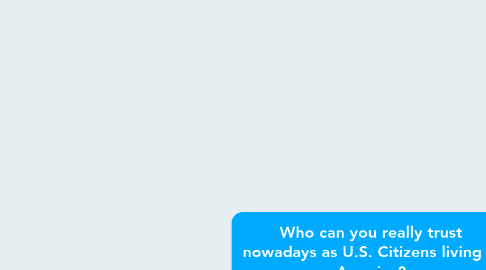Who can you really trust nowadays as U.S. Citizens living in America?
by Johnny McCarthy

1. Our Government?
2. The Media?
3. Source 4: In part of this book Kathryn Olmsted explains why over third of the American population believe that our own government had some role in the 9/11 terrorist attacks. She explains why we would ever think our own government would plan attacks on our own soil and it is because it has happened before and there is proof.
4. Souce 1: In Donte Stallworth's article "Here's Why 9/11 Conspiracy Theories Still Thrive In America" he explains his point of view on the 9/11 conspiracy and what got him caught up in the mystery. Donte explained how he started to research back into the 1900s and started discovering times where the "CIA had assisted the Mujahedeen leading up to and during their fight to repel the 1979 Soviet invasion of Afghanistan" which shows how we had past relations and trust which our former enemies. Robert Goldberg also stated a great point in this article when pointing out how “You have this secrecy industry in the United States, this idea of keeping millions and millions of papers classified as secrets, and where many Americans believe where there's smoke, there's fire". When we are kept from so many secrets we are forced to create are own assumptions and opinions and when these ideas start to become a popular topic and belief, a conpiracy is created.
5. Source 2: Joe Martino's article was more about providing facts about the 9/11 attacks that cannot be argued and therefore create some kind of ground or starting point of where to start creating your point of view on the 9/11 attacks. But the article frames the audience more towards the side of believing that the government was involved. Priming and framing are key components to both the media and the government when it comes to persuading the people to support a specific belief and a specific side of that belief.
6. Source 3: In William Saletan's article "Conspiracy Theorists Aren’t Really Skeptics", he takes a psychological look at the people who believe in conspiracies. The Saletan talks about how conspiracy theorists are like everyone else, "selective doubters" and it simply comes down to what you believe in. Saletan made a great point when stating "The more you see the world this way—full of malice and planning instead of circumstance and coincidence—the more likely you are to accept conspiracy theories of all kinds" but how can you believe that the world is full of just circumstance and coincidence? Everything happens for a reason and it is a constant chain reaction of events and decisions that in the end impact everyone.
7. Source 5:: In the book "Among the Truthers", Jonathan Kay has a section within a chapter called "The 9/11 Effect". This section did not solely focus on the affect of 9/11 but the affect of numerous events prior to the 9/11 attacks and after the attacks. Jonathan Kay stated how "Terrorism is effective" and it "causes people to choose sides", for example, to go to war with Iraq or not to go to war with Iraq and this is exactly how the 9/11 conspiracy all started.
8. Neither?
9. Source 6: In Maria Vulteggio article, "9/11 Conspiracy Theories: Why do People Believe in September 11 Conspiracies", she simply attempts to explain why people believe in conspiracy theories and states how "experts said there are several underlying causes why conspiracy theorists are compelled to go against official reports from the government and mainstream media." Maria then goes on to explain how people tend to believe in conspiracies due to lack of trust in the government. In the 1950s, 75 percent of americans said they could trust the government to do what is right. After events, such as, the Vietnam War, Watergate wiretapping scandal and President Bill Clinton's intern romance, now only a small majority of Americans trust the government to do what is right (Robert Goldberg).


